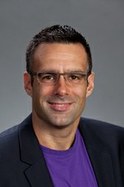CBE Seminar: Bert Chandler, Trinity University

Bert Chandler, PhD
"Gold Catalysts for Hydrogen Purification: Mechanistic Tools, Hammett Studies, and a Unifying Mechanism for CO Oxidation over Au"
Abstract:
Hydrogen, the smallest molecule, is a critical industrial chemical for fertilizer (and therefore food) production as well as transportation fuels. Global industrial hydrogen production is a massive industry, totaling over 50 million tons annually and accounting for roughly 3% of global annual energy use. Hydrogen is typically produced via the steam reforming of natural gas, followed by water-gas shift units; thermodynamic and kinetic limits for these processes generally result in a hydrogen feed that contains about 1% CO, which must be removed before it is used in downstream catalysts. Current hydrogen purification methods (methanation or pressure swing adsorption) either consume substantial amounts of hydrogen or are relatively slow and capital intensive. The CO PROX reaction, which preferential oxidizes CO with O2 in the H2 feed, is a promising alternative to these methods.
Supported gold nanoparticles are now well known to be the most active low temperature CO oxidation catalysts available. Gold is also a notoriously bad hydrogenation catalyst, so it ought to be ideal for PROX; however, despite intense study over the last 15 years, there have been exceedingly few reports of successful PROX catalysts. This seminar will focus on our efforts to develop kinetic tools to better understand supported gold catalysts, build a mechanistic understanding of the CO oxidation reaction, and our early successes in CO PROX. We are applying a number of mechanistic chemistry techniques, such as Hammett studies, kinetic isotope effects, and Michaelis-Menten kinetics, to better understand how support effects and water tune the chemistry of Au nanoparticle surfaces. These studies, combined with collaborative density functional theory calculations, have led us to a deeper understanding of O2activation over Au, a new proposed mechanism for CO oxidation, and significant advances in CO PROX catalysis.
Biography:
Bert Chandler earned a BS in Chemistry from Georgia Southern University (1994) and a PhD in Inorganic Chemistry from the University of Minnesota (1999), working with Prof. Lou Pignolet. He went on to a postdoctoral fellowship in the Department of Chemical Engineering at the University of South Carolina with Prof. Michael Amiridis. He began a faculty position at Trinity University, a small primarily undergraduate institution in San Antonio, TX, in 2001 and is currently Professor of Chemistry. He has served as the chair of the Southwest Catalysis Society, on the Board of Directors of the Organic Reactions Catalysis Society, and on the Scientific Advisory Board of Research Corporation. His long term research interests are in nanoparticle synthesis and properties, particularly for heterogeneous catalysis. This has especially included applying various physical organic chemistry techniques and Michaelis-Menten kinetics to understand changes in heterogeneous catalyst and nanoparticle properties.
This seminar is sponsored by the Department of Chemical & Biomolecular Engineering.
Please view the flyer for more information.